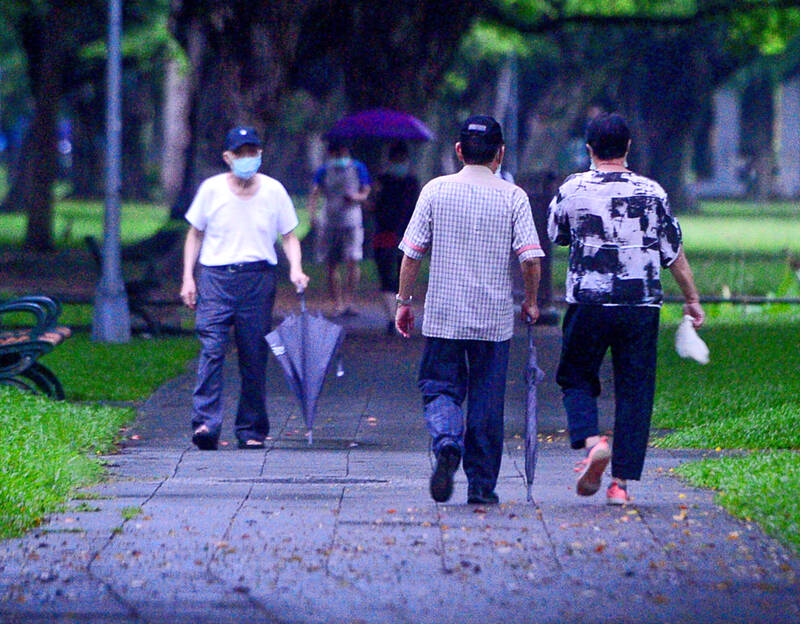The government aims to extend the average life expectancy by three years to 82 and reduce the average unhealthy period of one’s lifetime from 10 percent to 8 percent, or about 6.56 years, Premier Cho Jung-tai (卓榮泰) said at the Healthy Aging Forum in Taipei on Tuesday.
While average life expectancy in Taiwan is almost 80, Taiwanese spend an average of eight years in poor health, meaning that the average Taiwanese spends about 10 percent of their life unhealthy, bed-ridden or in need of care, Cho said.
The government’s medical expenses must increase dramatically if it is to increase life expectancy and the number of healthy years, he said.

Photo: Wang Yi-sung, Taipei Times
It must prepare long-term plans for medical and care services so that Taiwanese can enjoy a healthier and happier life in their later years, he said.
The goal is to reduce the stress on families and caregivers by ensuring that the public receives greater support, he said.
The Presidential Office established the Healthy Taiwan Promotion Committee to set essential milestones for achieving the national vision of a “healthy Taiwan,” he said.
The government is developing health policies, Cho said, giving the example of the 888 Program, which aims to admit 80 percent of patients with the “three hypers” — hyperlipidemia, hyperglycemia and hypertension — under care to ensure they are acclimated to medical consultations and have their conditions under control, Cho said.
The government’s cancer treatment and prevention policies, such as increasing rates of early-stage cancer screenings, targeted gene screenings and precision medicine, and the establishment of a new fund of NT$10 billion (US$304.3 million) to acquire new drugs for cancer treatment, aim to reduce cancer-induced mortality rates by one-third by 2030, he added.
The central government’s fiscal budget for this year grew by NT$280.6 billion compared with last year, much of which is due to increased funding for the National Health Insurance and other health-related programs, he said, urging legislators to be “rational” when reviewing the budget.
Cho said the forum is a significant event and thanked the American Chamber of Commerce in Taiwan (AmCham) for providing invaluable opinions on Taiwan’s economy, energy, agriculture, technology development and other fields.
The forum was held in Taipei and cohosted by AmCham and the American Institute in Taiwan.

A Chinese aircraft carrier group entered Japan’s economic waters over the weekend, before exiting to conduct drills involving fighter jets, the Japanese Ministry of Defense said yesterday. The Liaoning aircraft carrier, two missile destroyers and one fast combat supply ship sailed about 300km southwest of Japan’s easternmost island of Minamitori on Saturday, a ministry statement said. It was the first time a Chinese aircraft carrier had entered that part of Japan’s exclusive economic zone (EEZ), a ministry spokesman said. “We think the Chinese military is trying to improve its operational capability and ability to conduct operations in distant areas,” the spokesman said. China’s growing

Taiwan yesterday denied Chinese allegations that its military was behind a cyberattack on a technology company in Guangzhou, after city authorities issued warrants for 20 suspects. The Guangzhou Municipal Public Security Bureau earlier yesterday issued warrants for 20 people it identified as members of the Information, Communications and Electronic Force Command (ICEFCOM). The bureau alleged they were behind a May 20 cyberattack targeting the backend system of a self-service facility at the company. “ICEFCOM, under Taiwan’s ruling Democratic Progressive Party, directed the illegal attack,” the warrant says. The bureau placed a bounty of 10,000 yuan (US$1,392) on each of the 20 people named in

Nine retired generals from Taiwan, Japan and the US have been invited to participate in a tabletop exercise hosted by the Taipei School of Economics and Political Science Foundation tomorrow and Wednesday that simulates a potential Chinese invasion of Taiwan in 2030, the foundation said yesterday. The five retired Taiwanese generals would include retired admiral Lee Hsi-min (李喜明), joined by retired US Navy admiral Michael Mullen and former chief of staff of the Japan Self-Defense Forces general Shigeru Iwasaki, it said. The simulation aims to offer strategic insights into regional security and peace in the Taiwan Strait, it added. Foundation chair Huang Huang-hsiung

PUBLIC WARNING: The two students had been tricked into going to Hong Kong for a ‘high-paying’ job, which sent them to a scam center in Cambodia Police warned the public not to trust job advertisements touting high pay abroad following the return of two college students over the weekend who had been trafficked and forced to work at a cyberscam center in Cambodia. The two victims, surnamed Lee (李), 18, and Lin (林), 19, were interviewed by police after landing in Taiwan on Saturday. Taichung’s Chingshui Police Precinct said in a statement yesterday that the two students are good friends, and Lin had suspended her studies after seeing the ad promising good pay to work in Hong Kong. Lee’s grandfather on Thursday reported to police that Lee had sent